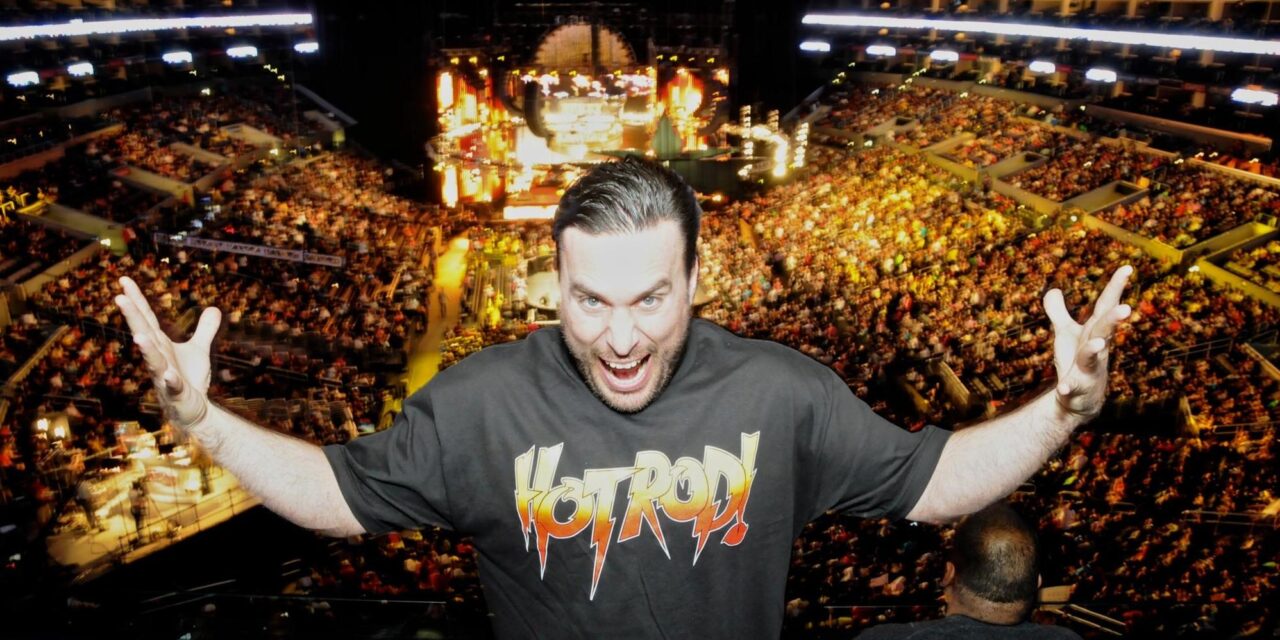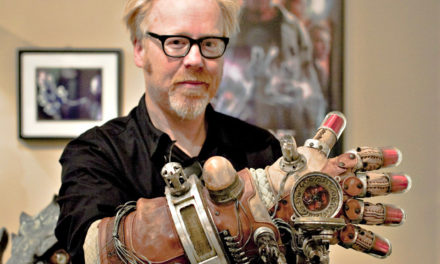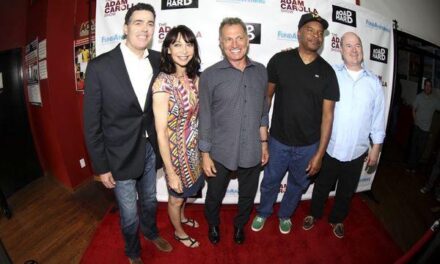Steve Simeone kindled his rapid-fire storytelling chops in suburban Philadelphia, seizing every opportunity to steal a laugh from his two brothers. He’s been a banker, and he’s worked for the Philadelphia Eagles. But his comedy career really took off with a series of open mics that would eventually earn him the title, “Funniest Comic in Philly.”
Pauly Shore, a celebrity judge at the event, invited Simeone to Hollywood, where he worked the door at The World Famous Comedy Store like so many successful comics before him (Sam Kinison, Marc Maron, Don Barris, etc.).
Steve has spent the last decade honing his craft at comedy clubs across the country. He’s done his share of TV, and he’s toured with his childhood hero “Rowdy” Roddy Piper. Jealous?
His podcast, Good Times with Steve Simeone is brand-spanking new. And just two episodes in at the time of this interview, it’s already generating buzz on iTunes and in the comedy community. He’s a super-friendly guy, and I was happy to get to talk to him.
So, you’re two episodes into podcastia. How’s the water?
I love everything about the podcast world. I love the intimacy with the audience. I love being able to share a story without the immediate expectation of a laugh. Most importantly, I love hanging out. I love hanging out with my guests, and just sharing stories about the “Good Times” thus creating more good times. It’s just so cool that modern technology allows us all to hang out together. People get to hear our conversation, then give me their input via Twitter, Facebook, or the comment section on iTunes. It’s amazing. I’m simply shocked at how people have responded, and I’m excited to connect with them even more.
Why’d it take you so long to get one going?
Well, there’s two ways I’m going to answer this one. The first answer is, I tried. (Insert Yoda reference) I loved being a guest on The Skeptic Tank, The CRABFEAST, and About Last Night. I knew I wanted to do a podcast desperately. I had no idea on how to handle the technical aspects of a show. I needed help. I tried unsuccessfully to get a podcast on various networks around town, and was told no. It wasn’t always a direct no, but like when you ask a girl out, if she doesn’t say yes, then no matter what she says, her answer is no haha.
Then Roddy Piper asked me to co-host his show The Rod Pod. It was a dream come true. The plan at the time was for me to co-host his show, and after an audience was built, I was allowed launch my own. Then there were issues with his show, it switched networks a few times and eventually we stopped recording all together. I really hope that The Rod Pod comes back to life, even if I’m not asked to join in on the fun, I can’t wait to listen to Roddy’s stories.
After about two years of trying to get a network, I finally broke down and bought my own equipment a year and a half ago. I was like a kid with a new toy, and started to interview all of my friends. I was doing my podcast. In fact, episode two with Steve Mazan was recorded a year ago. The reason why it took so long to actually share them with the world is my ignorance about the technical aspects of posting my recordings with Stitcher and iTunes. I simply didn’t know how to do it. Ari Shaffir was kind enough to give me a tutorial but when he moved to New York, I was lost again.
Fortunately a few months ago Uncle Joey (Joey Diaz-Church of What’s Happening Now) encouraged me to start my own. His producer Lee Syatt, offered to handle all of the technical stuff for me, and now FINALLY, after three years, I have my own podcast.
That’s one way to answer your question. It’s the truth. It took me forever to launch my own podcast because I needed help with the technical side of things. However, I think the most honest answer is fear. That’s really the reason why we don’t do what we really want to do. I was afraid it wouldn’t work. I was afraid people wouldn’t like it. I was afraid I would try my best, and it wouldn’t be good enough to get noticed. Fear sucks. It’s the reason why my cd hasn’t been released. It’s the reason why nobody has read my screenplays. I’m getting better at battling my fears. So this year, I promise I will not only continue the podcast, but release my first CD “Remember This For When You Get Sad”, and finish my first script.
There are a lot of comedy podcasts out there. In your opinion, what distinguishes you from the pack?
The concise answer is that I hope it’s positive. My goal is for the listener to not only laugh along with us, but somehow walk away feeling better about life.
Between 1995 and 2000 comedy was less of a priority in your life. What did you glean from those dry years that you apply to your act and your show today.
Ugh…my quarter life crisis. I was a recent college graduate, trying my best to figure out life. My 20s were incredibly difficult, like middle school with hang overs and student loan debt. My entire life I was told I could do anything I wanted with my life. In college, I felt like an incredible ball of potential, then upon graduation, I was told “get a job.” Over night, I went from feeling like I could conquer the world to a disappointment.
Eventually I took a job in Corporate America, and immediately, knew I didn’t belong there. Sunday nights were the worst. I would get so depressed about returning to work on Monday morning that I would just get in my car, drive and listen to Jim Croce and songs like Super Tramp’s “Long Way Home.” Hahaha! Those drives are the reason why I release my podcast on Sunday nights.
I grew up in a place called Delaware County Pennsylvania. It’s essentially Philadelphia with easier parking and better public schools. People work HARD for a living. I like to describe it as a place where people work jobs that they hate to support the people that they love. That mentality will always be a part of me. I had my first lemonade stand at five years old, I sold candy, fireworks, and baseball cards until I graduated from High School. I raked leaves, and shoveled snow. I didn’t mow lawns because that was my older brother Chris’s racket. During college, I worked construction, made pizzas, and scrubbed dishes at The Jersey Shore.
A strong work ethic was instilled in me from a very early age. I take that same work ethic to the stage. I feel incredibly honored and privileged to step on a stage. I know that those people in the audience are most likely trying to forget about their job, their worries, the problems of life. I know that this might be their only night out all month, if they have kids, it might be the only time they get to go out all year. I give them everything I have. I want the audience to laugh. I feel that if you can make somebody laugh, you have a moral obligation to do so.
I feel I need to clarify this from a writing perspective. As an artist, I can’t let the audience dictate what I’m going to say, I have to be true to myself, and say things that I think are funny. I fully understand that comedy is subjective and some people won’t think I’m funny. That’s great. I can’t expect to please everybody. But what I can do, is treat every time I’m on stage as if it’s my first time on stage, my last time on stage, and my only time on stage.
Making the decision to become a comedian was a sheer act of desperation. I tried everything I could possibly do to make a living and nothing worked. So to answer your question, the most important thing I gleaned from those years was, that I didn’t have a choice. Once I decided to pursue comedy as a profession, something amazing happened, a miracle really. I slowly learned how to live. I was forced to live in the moment, appreciate the little things, rely on God, and celebrate the gifts of my family and friends. I went from being completely miserable and hating everybody, to feeling this incredible joy, and loving everybody. This perspective is the point of view I want to share, whether it’s the podcast, my stand-up, or films.
Did Rowdy Roddy Piper ever choke you out with his famous sleeper hold?
Roddy is the one coolest dudes in the history of life. He actually did show me how to apply the dreaded sleeper. During the process he applied it to me, but kindly, didn’t choke me out. I’m a comedian, not a tough guy.
A lot of people find catharsis in doing their podcasts. Is podcasting therapeutic for you?
Absolutely. I describe the show as “self help through nostalgia”. The amazing thing about nostalgia is that it’s easier to see the good things in the past, our minds simply, filter out the worst parts. Now, what I learned to do, and I’m still working on it, but what I’m learning to do is see the best in the present. To sort of apply that nostalgia feeling to every moment. Look, if you’re an adult, there’s always a reason to be miserable if you CHOOSE to see it. However, if you want to be happy, you can simply CHOOSE to see the best.
About seven or eight years ago I started to tell the same types of stories on stage that I told off stage. Making the adjustment from conversationally funny to stand-up comedy wasn’t easy. Like I mentioned earlier, with Stand Up there’s [instant gratification through laughter]. There’s only so long you can go without a laugh before it ceases to be stand-up comedy. The podcast is a game changer. I’m able to go deeper.
And finally, I believe laughter to be therapeutic. I’m a blessed man because some of the funniest people in the world are my closest friends. I used to brag that there were funnier people in my cell phone than on television. Now, those same people from my phone are taking over television. This podcast is a great opportunity for me to hang out with my buddies and just laugh. And what makes me feel even better is sharing that laughter, and sharing my friends with everybody listening. That’s all I want my show to be, is a hang out. It’s not an interview. It’s just two friends hanging out, talking openly, honestly, sharing stories that at times are really funny.
Who can we expect to hear from next on the show?
Let’s see–up next is the Hot Rod (Roddy Piper). I was worried about sharing that podcast because he gets so personal. I wasn’t really sure if everything we talked about fits the definition of Good Times. It is, however, a fascinating conversation. For sure there are laughs in there, and much to think about. I’m eager to see people’s reactions to it.
After Roddy is comedian Steve Trevino. We laughed for a solid hour about his childhood in South Texas. I think his episode will juxtapose nicely with Roddy’s. From that point, I would really like to get my brothers on the show. I seriously can’t wait for that. Ideally, I’ll have them call in once a month. All of my comedian friends have said they’d do the show and since we don’t stick to a format, I really do want to have the same guests on more than once. Listeners are already requesting more with Steve Mazan.
At one point, I wanted to make a documentary called “People In My Cell Phone” haha. Now, this podcast will allow me to do that without buying a camera and learning how to edit. I have so many cool friends. Not just world class comedians, but special forces commandos, teachers, professional strongmen, moms, truck drivers, Catholic priests, rock stars, little league coaches, construction workers, and CEOs. It should be interesting to hear about the little kids that grow up to become these professionals.
###
Steve’s website: awesomesteve.com
Follow Steve on Twitter @stevesimeone






